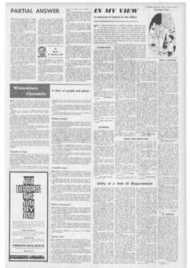Page 1, 16th April 1965
Page 1

Report an error
Noticed an error on this page?If you've noticed an error in this article please click here to report it.
Tags
Share
Related articles
More Dialogue With Atheists
Vatican Atheism School
'dialogue' Plan With Atheists
'talk To Atheists' Call
'we Must Talk And Work With Communists'
ROME 'BRIDGE' WITH ATHEISTS
Hi? new secretariat for relations with nonbelievers will seek to create a bridge between the Christian and Communist worlds. Cardinal Koenig, its head, has declared that "peace through dialogue" will be one of its chief aims.
The establishment of the
secretariat was officially announced at the end of last
week, though Pope Paul's plans for it have been known for some time. It is expected to act as a framework within which the Pope can extend his work as a peacemaker in the world.
Though the Church's condemnation of atheism as a moral error remains firm, Cardinal Koenig has made it clear that the secretariat cannot be considered as anti-atheist.
"Thc Church does not wish to organise a fight against atheism, but rather to uncover all possible ways of safeguarding the religious life in a modern world," he said.
The Cardinal explained that this will be done in two ways: by studying the various atheistic schools of thought and philosophy throughout the world, and by establishing contacts to bring about a change of opinion to work for peace.
Although he described the Church's main concern in founding the new secretariat as a "pastoral one, the same as all the other secretariats", he did point to one major difference between it and the other secretariats in dialogue with non-Catholics. In dealing with the great religions of the world "you know who your partner is", said Cardinal Koenig.
"You are speaking to the Protestants, or the Mohammedans. Rut when you are speaking to an atheist you are really only dealing with an individual."
The establishment of the new secretariat provides the final and outer circle of three to which Pope Paul referred in his encyclical Ecclesiam Suam as the basis for the Catholic Church's dialogue with the modern world.
lle placed the Catholic hierarchy and people around himself as Vicar of Christ, in the centre. The first of the concentric circles was the separated Christians, Protestants and Orthodox, the second nonChristians who, however, believe in Divinity, and the third, the nonbelievers — those who profess atheism or do not believe anyway.
Organisations for contacts \kith the first two circles were created earlier—the secretariat for the promotion of Christian unity, under 83-year-old Cardinal Bea, which the late Pope John set up, and the secretariat for non-Christians, established by Pope Paul under 70year-old Cardinal Marella.
Before the secretariat for nonbelievers was set up, a working group had already been gathering information. It was directed by Don Vincenzo Miano, dean of the Faculty of Philosophy at Rome's Salesian University. who now becomes secretary of the secretariat,
Clearing-house
A Church study of atheism was suggested at the Vatican Council in 1963 by Bishop Franjo Franic of Split, Yugoslavia. He felt a special commission formed by the Roman Curia could "serve as a clearinghouse to help bishops throughout the world in combating atheism".
More recently, at the Catholic Intellectuals' Week in Paris last month, Coadjutor Bishop Pierre Veuillot of Paris strongly endorsed a "meeting of minds" between Christians and non-believers.
1 he new secretariat will attempt "to dispel hatred wherever it is making use of religious or antireligious means" by taking the initiative on three main counts: studying practical atheism in the sense of religious indifference; examining the origins and effects of doctrinary atheism; and examining atheism as a policy of State as displayed in Communist countries.
The secretariat will by no means Continued on Back Page, Col. 3
blog comments powered by Disqus











